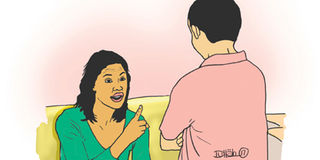PARENTING : Protect your child from crime

What you need to know:
This incident happened a few months after another 14-year-old had been apprehended for defiling a six-months-old baby, whose mother had left under the care of the sisters to go for work.
Assad Kakuma, a four-year-old in Kiwatule, a Kampala suburb was stabbed to death by a 14-year-old girl. The suspect threw a knife at the victim after he reportedly disturbed her while cutting fish. This incident happened a few months after another 14-year-old had been apprehended for defiling a six-months-old baby, whose mother had left under the care of the sisters to go for work.
Such are some of the offences children could commit. This leaves many questions. What makes children engage in crime, how can parents help children not to involve in criminal activities?
Fr Mathias Yawe, Luzira Prisons counsellor and Dorothy Kebirungi, a counselling psychologist at Infectious Disease Institute, say children engage in criminality because of factors such as watching violent films, drug use, peer influence, living in violent homes and lack of basics.
Home events
Children exposed to violence at home or in community, Fr Yawe says, are potential criminals because of despair, uneasiness, and disorders. If a child sees parents in regular physical exchanges they also adopt the same manners. They grow up with a conflict-hardened mind and they do not think twice before they act.
“You may find a child playing with deadly items such as pangas, axes or hoes. This is what they have grown up seeing their parents do,” he says.
If a child has ever witnessed a relative killing his parent or another family member. That experience and anger sits in his mind and he revenges in future. Such can also be blamed on indiscipline, alcohol and drug use.
Peer influence
Agatha Anyiko, a social scientist, explains that peers can be a good or a bad inspiration depending on a youngster’s age. Peers who are associated with negative activities such as robbery, theft, drug abuse and fighting mislead juvenile into illicit deeds.
“Children believe in their peers. Besides, they are gullible and can follow any decision by peers. They don’t know whether what they are engaging in is wrong or right,” Anyiko says.
Poverty
Kebirungi says, with poverty, children are unable to get the basic needs such as clothes, food, shelter and education.
“What do you expect from a child who slept hungry? What do you expect from a child who lacks clothing or who admires others? The solution is to steal to survive and as such you have child pickpockets,” she explains.
Poor parenting
Kampala Metropolitan Police spokesperson, Emilian Kayima, recently noted majority of suspects they have arrested snatching phones, wallets and other accessories on Kampala streets are aged between 14 and 24 years. This, he attributes, to family breakdown and reluctances in parenting.
“Parents need to increase bonding time with their children. Try to know who their friends are. We have arrested children in criminal activities yet they come from modest families. They just need parental guidance,” Kayima says.
Kebirungi says many children have learnt criminal activities from watching films that involve use of guns, knives and machetes.
“When a child watches a film where people used guns to get rich, or have fought to get what they need, they become excited. They also want to try out what they have watched,” she adds.
Fr Yawe says desperate measures call for desperate solutions. “If a child does not find what gives him joy in a home, he is likely to find it elsewhere. Getting the needs could be killing or robbery,” he stresses.
Parents are warned to eliminate watching movies that negatively affect the youngsters’ brain. “When you are watching television at home, be careful that what they watch is not scary or triggers bad habits,” Kebirungi observes.
Parents should involve behavioural counsellors when their suspicious manners persist. The therapist would help to identify the gap that could be triggering the child’s bad action. In the end your child’s future makes or breaks them in society.




